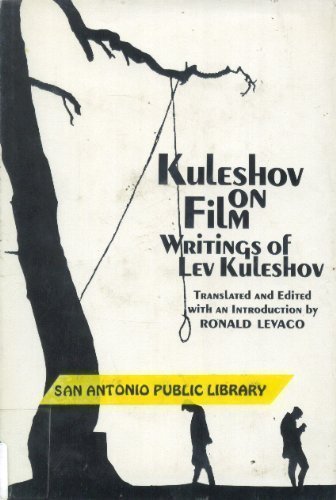Kuleshov on Film: Writings by Lev Kuleshov book
Par braun josephine le samedi, novembre 26 2016, 06:56 - Lien permanent
Kuleshov on Film: Writings by Lev Kuleshov. Lev Vladimirovich Kuleshov, Ronald Levaco

Kuleshov.on.Film.Writings.by.Lev.Kuleshov.pdf
ISBN: 0520026594,9780520026599 | 121 pages | 4 Mb

Kuleshov on Film: Writings by Lev Kuleshov Lev Vladimirovich Kuleshov, Ronald Levaco
Publisher: Univ of California Pr
Eisenstein was a pioneer in the use of montage, a specific use of film editing. Film language, as it would later be termed, had very little in the way of grammar, most Eisenstein's contemporary soviet theorist, Lev Kuleshov applied this precept to character development. At first, I had Mozhukhin “From 1918 on we studied film writing, or how to write with a camera. By 1919 Lev Kuleshov had already started to make fundamental experiments to push the use of montage, and formulated what has come to be known as the “K” effect: “From old films I took shots of the actor Mozhukhin and edited them with various other shots. Sergei Eisenstein and Vsevolod Pudovkin are his students and had develop his theories of montage editing. Lev Kuleshov The founder of the world's first film school and he is very first film theorist for Soviet Montage. The Kuleshov effect is a film editing technique that was recognised and demonstrated by Russian filmmaker Lev Kuleshov between 1910-1920 during his montage experiments. Originally known as the Trailer Park, the contest has been renamed after the Kulsehov Effect, a study in the impact of film editing on viewers by Russian film maker Lev Kuleshov in the 1920s. (The Kuleshov Effect is an early editing technique developed by Russian filmmaker Lev Kuleshov in where he would give emotional attachment to a blank face by showing something that has emotion immediately after. Lev Kuleshov was a Russian filmmaker and media theorist in the 1920's who looked at how the audience read film. Flicker Alley's “Landmarks of Early Soviet Film” is a box set of eight remastered titles from the Soviet cinema's most exuberantly experimental period comprised of two fiction films by Lev Kuleshov, “The Extraordinary Adventures of Mr. But Ford is so much better at writing spinoffs of other genres. Most film narratives were analogous to silently filmed plays; each scene took place in front of a stationary camera, which was strategically placed to view the entire set, without any cutting or variation. He experimented with a single shot, of a mans face and put it alongside emotion provoking shots. I always thought I was making Five Easy Pieces with a robot the whole time, and I was wrong. We were ignorant, and suffered from the absence of a film-alphabet. Concerning emotional resonance in cinema the Kuleshov Effect is an important concept. It rests on the theory of montage and the effect that film editing has on evoking emotions from a viewer. He and his contemporary, Lev kuleshov, two of the earliest film theorists, argued that montage was the essence of the cinema.